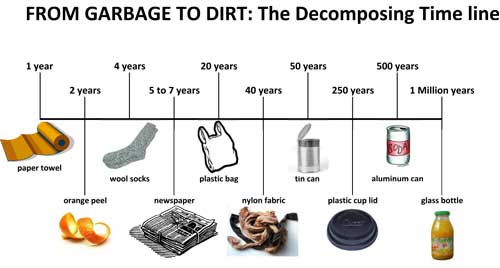The wastes take a considerable amount of time to get decompose and out of them, the plastic wastes consume most of the time, approximately 10 to 100 years.
We can say that plastics are not biodegradable wastes they actually break down into smaller particles or persists anaerobically. The waste materials require oxygen for go with the process of composting waste, that is, the waste composts aerobically but in the landfills, oxygen is absent as they are considered to be airtight areas so the waste breakdowns anaerobically.
Basically, the food scraps are biodegraded by the bacteria after they are buried into the soil and they are advantageous to the soil as they play an important role towards soil fertility.
“The compostable wastes are much better than the conventional one”
Production of plastic till date:
According to BBC reports, from the time since the plastic is being produced (about 70 years ago), we have consumed over 8.3 billion tonnes of plastics and out of which the plastic waste sums up to 6.3 billion tonnes. In landfills, the plastic water bottles need approximately 450 years to decompose it.
 One genuine way to break down plastic is photodegradation. It is a process which does not require bacteria instead the UV rays decompose the plastic into small pieces when the plastic waste is brought into contact with the rays.
One genuine way to break down plastic is photodegradation. It is a process which does not require bacteria instead the UV rays decompose the plastic into small pieces when the plastic waste is brought into contact with the rays.
Types of Biodegradable plastic:
- Petroleum-based Oxo-biodegradable plastic
- Plant-based hydro biodegradable plastic
Scientist’s discovery for the elimination of plastic waste:
A mutant enzyme named PETase has been recently discovered that too accidentally, which can help us to get rid of plastic waste slowly but effectively. The enzyme is so named because it eats up the light weighed plastics which are basically used in soft drinks and water bottles. The plastic is known as Polyethylene terephthalate which is abbreviated as PET.
The mutant enzyme discovered by the scientists is still in its early age and at present, it can only recycle the plastic bottles and turn them into optic fiber. The optic fiber so produced can be used in making of clothes and carpets.
Time taken by different waste materials to decompose:
- Aluminum Cans
In landfills, the time taken by the aluminum cans to decompose is 80 to 200 years. In America, 1, 20,000 cans are recycled at a time.
- Disposable Diapers

They take a time of 250 to 500 years to decompose in landfills
- Food waste
Different food materials require a different amount of time, that is, the time of decompositions varies from one food item to another. An orange peel takes about 6 months to decompose whereas a banana peel or an apple core only need 30 days to decompose.
- Sanitary napkins
Sanitary napkins need 500-800 years to decompose anaerobically.
- Glass
It is reusable as it is made up of sand. It can be broken down and melted and carved into a new glass but once it is thrown away in landfills it takes a billion of years to decompose.
- Paper waste
Papers can be easily recycled and reused. It is a way to get rid of a lot of landfill space but once they are to be decomposed anaerobically, they require 2 to 6 weeks of time to decompose.
- Cigarette butts need 10 to 12 years to decompose whereas milk cartoons require 5 years to decompose.
Conclusion:-
We need to reduce the adverse impact of the waste on the planet and not just decompose it. So, everyone around should take a step to reduce their part of waste by using fewer plastics and more reusable items.

